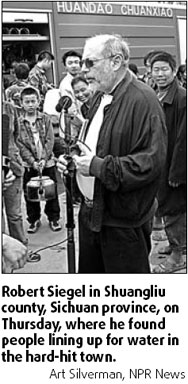Sounds from the scene
By Alison Klayman (China Daily)
Updated: 2008-05-21 07:09
Updated: 2008-05-21 07:09
|
Melissa Block (front, left) on location in Dujiangyan, Sichuan province, on Wednesday. Block spent a harrowing day with a couple Wang Wei (not pictured) and Fu Guanyu (front, third from left), as rescuers searched for their son. Andrea Hsu, NPR News |
A chance encounter on a mountain road outside Chengdu is the one defining moment radio producer Art Silverman will never forget.
His team was on the move looking for stories after the earthquake.
"We stopped and spoke with a beautiful woman," he said.
"She had walked 35 km from her village which had been destroyed."
He says the woman was with her baby and some older relatives. They had no contact with her migrant-worker husband.
"This was the one time I couldn't take a picture. I'm not that much of a journalist. I couldn't put a lens between me and her."
Silverman, and a team from America's National Public Radio (NPR), have been in the middle of the devastation and their reports are helping many Americans understand the full extent of the tragedy.
The hosts continue to post their experience on the Chengdu Diary blog, which was intended to provide an inside look on how NPR was preparing for their China series.
The blog has now become a global English dialogue and message board about the quake.
When NPR made the decision last winter to host a special week of programming from China, the American noncommercial news outlet knew they wanted to put the spotlight somewhere outside Beijing and Shanghai.
In February, NPR executive producer Chris Turpin and producer Andrea Hsu came to scout out a large city with a vibrant cultural scene, historical significance and a booming economy. A city that was well known in China, but relatively unknown to most of NPR's 26 million listeners.
That city was Chengdu.
Over the next few months, preparations were made for a variety of feature stories that would air in May to introduce NPR listeners to China and Chengdu.
Two of the hosts on NPR's flagship afternoon news program All Things Considered, Melissa Block and Robert Siegel, arrived before the scheduled week of programming to put together their stories.
Their Chengdu Diary blog (http://www.npr.org/blogs/chengdu) publicized the experiences of the journalists and producers as they researched their stories.
Host Block and her producer Hsu blogged about sampling spicy "ma la" Sichuan food, and trying to navigate Chengdu's complex traffic patterns and pedestrian crossings.
By the afternoon of Monday, May 12, a scheduled reporting mission for a China features series had turned into round-the-clock breaking news.
Block was at a Chengdu church interviewing a Christian pastor when the earthquake struck. She recorded the sound of the quake and the confusion as people fled buildings and congregated on the streets.
"What's going on, the whole building is shaking," she says on tape, the surprise and alarm apparent in her voice.
She and producer Hsu met back with co-host Siegel and producer Silverman at their hotel, and the four plotted immediate excursions out into the surrounding area to begin reporting on the consequences of the quake.

Because of the hosts' chance placement in Chengdu, they were able to report from near the epicenter of the quake that same day.
Block went to Juyuan Middle School, and Siegel visited a Red Cross outpost in Dujiangyan.
This was the first time in China for the hosts, but not for some of their producers.
Silverman had visited almost 25 years ago. When he first arrived in Chengdu he found a much changed China.
But as he wrote on NPR's website, the China he remembered can still be found "wherever friends squat in groups to talk, or in the serenity in the eyes of an old man carrying a couple of live turtles on a string over his shoulder".
Now reporting on the earthquake's aftermath, Silverman's mission to find China seems less ephemeral.
"I understand how complex the place is and I have a sense of it," says Silverman.
"I knew China was a place I would never understand from five weeks of being here, but now I feel like I've been here two years with the outpouring of emotion I have experienced."
Comments included requests for status updates on particular places in Sichuan, like schools where people taught, orphanages where they had adopted their children or the beloved pandas at Wolong.
Many have also thanked the reporters for their sensitive and up close coverage of the rescue and relief efforts.
Jia Yu wrote on May 15: "Thanks for sharing the uplifting spirit of the survivors. They are amazing in facing tragedy."
NPR's All Things Considered will still host a week of programming out of Chengdu beginning today.
(China Daily 05/21/2008 page17)
|
||
|
||
|
|
|
|
